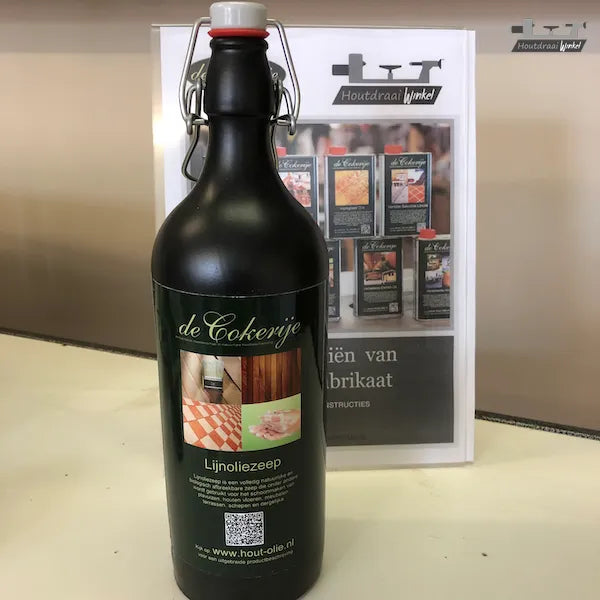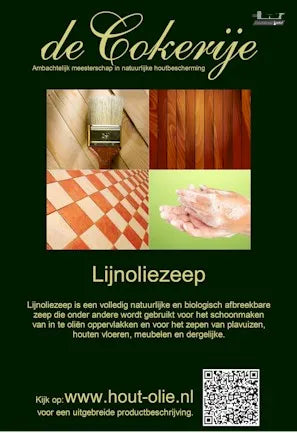Cokerije
Cokerije Natural linseed oil soap
Cokerije Natural linseed oil soap
Couldn't load pickup availability
Linseed oil soap is nature's friendly, perfume-free cleaning giant!
Linseed oil soap Linseed oil soap has many applications.
Use it for, among other things: Cleaning and degreasing wood that needs to be painted or oiled. Cleaning and protecting stone floors (tiles, concrete, etc.). Cleaning terracotta pots, tiles and the like. Cleaning and nourishing contaminated furniture.
Removing green deposits and algae Cleaning brushes Cleaning hands Cleaning clothes Soaping wood.
Instructions for use: For lightly soiled surfaces, dissolve approximately 50 ml of linseed oil soap in a bucket of lukewarm water (stir briefly). Apply the solution with a sprayer or brush and let it sit for about 10 minutes.
Then rinse thoroughly with clean water and allow to dry. For heavily soiled surfaces, use undiluted linseed oil soap, i.e.: rub the surface thoroughly with the undiluted soap, let it soak in for a while, rinse and let dry.
Grayed surfaces can be restored to their original color by treating them with oxalic acid. Background The basis for Linseed Oil Soap is Raw Linseed Oil without chemical additives or other substances that are bad for the environment, for health or that could adversely affect the final finish in any way.
Linseed oil soap has therefore been seen as the natural cleaning agent for many decades. Linseed oil soap not only cleans excellently, but is also completely biodegradable and also nourishes the wood somewhat because a thin layer of linseed oil is applied to the surface.
As mentioned, Raw Linseed Oil is the main ingredient for making this all-natural Linseed Oil soap that can be used to clean wood in preparation for an oil finish.
Click on this link for more information about Linseed Oil, its production, the different types and their applications.
We do not supply our linseed oil soap in plastic bottles but in stone jars. In Scandinavia, wooden furniture and floors are not only cleaned but also soaped with this. In that case, the wood is deliberately provided with a layer of soap (without rinsing) which acts as protection against contamination. By regularly wiping the furniture or floor with the soap solution, the soap layer and thus the protection of the wood are maintained. The advantage of soaping is that the furniture or floor often continues to look like new even after years of use and only acquires a beautiful patina. The disadvantage is that the soap layer is quite vulnerable, so it must be maintained regularly. However, the main use of this soap in our case is to naturally clean woodwork that is to be treated with oil or another finish. In that case, the soap cleans the surface neatly, leaving no harmful substances in the wood and in a way that combines well with the oil products to be applied. The soap is therefore not only ideally suited as a preparation for a Linseed Oil treatment, but Linseed Oil soap is also ideally suited for finishes based on Tung Oil or one of the products based on it. Please note: If you use linseed oil soap on other surfaces, try a small piece first to ensure that everything works properly. For example, linseed oil soap cannot be applied to cellulose varnish as it dissolves it and whether you would like it to be that clean...
Specification table
Specification table
Share




